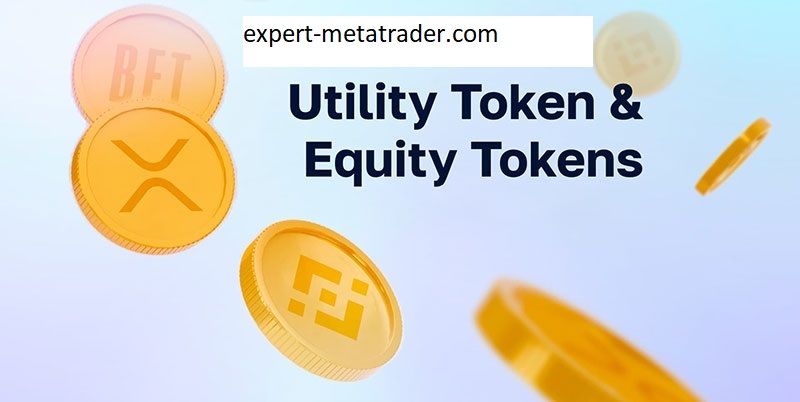
Although crypto coins and tokens fall under the larger umbrella of the cryptocurrency group, there are technical variations that make each one unique. As an investor, it is wise to appreciate these differences. Cryptocoins and crypto tokens are primarily the same from an end user’s perspective. However, the way they are built on the blockchain makes them different. In fact, cryptographic tokens can be divided into three categories: equity tokens, security tokens, and utility tokens. In this article, we show a comparison between equity tokens and utility tokens.
Labels: Order to build a Forex robot , Build a stock trading robot , Build a trading robot , Trader robot design , Free Forex Robot , Forex robot programming , Forex Expert Making Tutorial , Build a trading robot with Python , Download Forex Trading Robot , Buy Forex Trader Robot , Automated Forex Robot , Free stock trading robot , Learn how to build a Forex trading robot , Alpari trading robot , Forex robot for Android , MetaTrader robot design , MetaTrader robot programming , Forex robot design , Forex robot programming , Automated trading
Explore different types of tokens
Before going into the different types of tokens, let’s first explain the difference between crypto tokens and coins. Every crypto asset operates on top of a blockchain network. The native asset of the blockchain network is, to be precise, a coin. For example, Bitcoin (BTC), Ethereum (ETH), Solana (SOL), and Cardano (ADA) all technically have coins as the underlying asset of their respective blockchains. Conversely, any crypto asset created on top of an existing blockchain network is a token. Examples include Basic Attention Token (BAT) as an ERC-20 token on Ethereum, PancakeSwap (CAKE) as a BEP-20 token on BNB Smart Chain (BSC) and Serum (SRM) which uses the standard Solana’s SPL token works, pointed out. In addition, tokens can have multi-chain features with interoperable token standards for compatibility across multiple blockchain networks.
Therefore, tokens are crypto assets that run on top of another blockchain project. Additionally, we can categorize the thousands of crypto tokens available. As the crypto industry expands, so do individual features and uses for tokens in innovative and future projects.
What is utility token?
The permissionless, open source technology that powers blockchains and related assets means that anyone can create a token. As a result, there are thousands of cryptocurrency projects available. However, just because a token exists does not mean it is valuable. The value of a token or crypto asset is often based on its supply and demand, but arguably more important is the token’s utility. There are various operations and roles that tokens can serve. Additionally, tokens that fulfill specific needs in blockchain networks can collectively be classified as “utility tokens”.
Utility tokens, at face value, function just like any other digital currency. You can buy, sell and trade a utility token on any digital currency exchange. Additionally, investors can purchase utility tokens without executing any tokens. However, most utility tokens implement a tokenistic design that makes it more profitable to participate in platform activities and token operations than to hold the token.
Application token uses
Functional tokens can have one or a range of different functions. A “multi-use token” is a crypto-asset that has multiple properties and uses. Utility tokens are often critical to the security and smooth operation of a decentralized project. In this way, instead of a project running from a small centralized party, utility tokens enable projects to operate on a globally distributed level with a focus on decentralization.
Sovereignty
A popular utility token use case provides holders with sovereignty over certain platform operations. Each blockchain project has its own governance infrastructure with defining parameters. However, decentralized governance often involves the requirement of a governance instrument or token. Some projects work in such a way that one token is equal to one vote. Often, token holders must share their holdings in a governance protocol in order to vote on updates to a platform. Other times, projects require a minimum amount of tokens to cast a vote. Furthermore, every project works differently.
Providing sovereign rights with a utility token is a valuable feature as society evolves into a more decentralized world. It allows a project to evolve and grow with its users at its heart, rewarding participants for their loyalty and commitment. Decentralized governance is a positive way to facilitate the accessibility, growth and sustainability of a blockchain project.
Network Security
Another critical use case for a utility token is to ensure network security in a proof-of-stake (PoS) blockchain. The first blockchain (Bitcoin) and many ongoing projects use a proof-of-work (Pow) model, which is computationally intensive. PoS was introduced as an alternative to PoW, which requires nodes to share assets to participate in network consensus activities instead of spending large amounts of energy like PoW. As a result, PoS chains consume more than 99.9% less energy.
In addition to saving energy, PoS consensus models are more secure than PoW, without being exposed to the 51% attack. Also, many projects allow utility token holders to delegate their assets to existing validating nodes. In this way, project utility token holders can contribute to network security without having to meet full validation criteria and requirements. Therefore, each PoS project utility token holder has the potential to influence the power of the network.
Gas fee and transaction fee
There are generally two additional payments in transactions in the crypto industry: gas fees and transaction fees. If you are running a smart contract function, interacting directly with a blockchain (i.e. sending a transaction), computing power is required. As a result, users have to pay a small gas fee or platform fee to cover the required energy. Any remaining profit is sent to the validating node/miner that confirmed the transaction. Additionally, if users interact with a decentralized or centralized application, there may be a small transaction fee with each transaction. This is primarily to cover the profit margin for the development and sustainability of a program.
Another great feature of utility tokens is the ability to reduce or eliminate certain fees on different platforms. Each project can set its own parameters regarding the fee monopoly when users hold their utility token. Some projects offer users a reduction in transaction fees with the utility token, the more the reduction, the more tokens the user has. Alternatively, some platforms may eliminate (or cover) transaction fees for holders of their utility tokens.
Identity / Exclusivity
Utility tokens are publicly transparent, secure and have an immutable transaction history. Therefore, utility tokens can allow project organizers to determine their most loyal and attractive users. It can significantly assist marketing and PR campaigns with real-time insights into operational activities. Additionally, utility tokens can help projects automate rewards and rewards for their most dedicated users.
On the other hand, project utility token holders can have exclusive access to events or activities. Some projects automatically include utility token holders in airdrop giveaways. Also, having a utility token can give users a discount when buying assets from the non-fungible token (NFT) market.
What is equity token?
Equity tokens are a form of security token representing equity in an underlying asset (usually a stock or share) that is digitally recorded on a blockchain. Additionally, as with legacy infrastructure, contractual terms and conditions are set in the equity token itself. For example, owning an equity token can enable one to have ownership rights, shares or entitlements to the underlying asset. Equity tokens, on the other hand, may only follow the stock price performance of the underlying asset. As such, these equity tokens function more closely to utility token derivatives. However, equity tokens are beneficial for investors who want exposure to the price of an asset without the responsibility of ownership.
Benefits of stock tokens
This is a widely tested option. Its similarity to traditional equity issuance and strong regulations make it a safe option. This token allows you to maintain or control your wealth. Issuing equity tokens can result in the sale of assets that allow buyers to participate or not participate in the decisions of your company or activity. Equity tokens retain their value as long as your business or company continues to operate. It allows the interests of investors to be aligned with the interests of the company.
Which is better, utility token or share token?
Now that we know the types of use cases of a utility token, let’s examine how it differs from equity tokens. Utility tokens and equity tokens are sometimes called interchangeably. However, this is not entirely accurate. While utility and equity tokens have similar characteristics, there are also fundamental differences between the two.
Equity tokens are an extension of the same thought process as IPOs for investors who are familiar with the concept of equity investing, while those willing to take risks can invest in one of the utility tokens.
One notable distinction between utility and equity tokens is that the former is non-regular because it provides access to a service rather than a specific investment in an asset or company like equity tokens.
For those wondering if utility tokens are tradable, the answer is that they are identical to equity tokens in that they can be traded on different exchanges.
To generate returns for token holders, utility tokens must be balanced against the issuing company’s service facilities and the potential increase in demand.
Equity tokens, on the other hand, are regulated and issued by existing businesses, giving token holders voting rights that allow them to participate in operations.
Utility token holders may not be able to provide feedback or vote on the direction of the project. All decisions may be concentrated in the hands of founders and developers.
Contrast this with equity tokens, which act like shares in a company and allow the holder a greater say in the future of the project.
Simply put, while the price of equity and utility tokens may fluctuate, the main difference is that equity tokens give the holder ownership rights, while utility tokens act as coupons, giving equity holders ownership in the company’s platform. Or they don’t give any other property.
Conclusion
Equity tokens seem to be a better option for new cryptocurrency investors because they are an extension of equity in the traditional stock market and are an easier idea to understand. Because analyzing the digital currency price market may be difficult for many people








Comments (0)